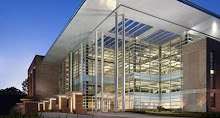UNF Named Best Southeastern College by The Princeton Review
Contact: Joanna Norris, Assistant Director
Department of Media Relations and Events
(904) 620-2102
The University of North Florida was just named one of the best colleges and universities in the Southeast by The Princeton Review. UNF is among 139 top colleges and universities receiving the designation “Best in the Southeast” in Princeton Review’s Web site feature “2009 Best Colleges: Region by Region.”
“Once again, the University is proud to have been selected as one of the best Southeastern Colleges by the Princeton Review,” said UNF President John A. Delaney. “UNF’s focus on teaching students and providing them with an individualized college experience is definitely putting us on the map.”
The 139 colleges The Princeton Review chose for its “Best in the Southeast” designations are located in 12 states, including Alabama, Arkansas, Florida, Georgia, Kentucky, Louisiana, Mississippi, North Carolina, South Carolina, Tennessee, Virginia and West Virginia.
“We commend all of the schools we named this year as our ‘regional best’ colleges primarily for their excellent academic programs,” said Robert Franek, Princeton Review’s vice president of Publishing.
The Princeton Review also designated 212 colleges in the Northeast, 120 in the West, and 159 in the Midwest. The 630 colleges named “regional best” represent about 25 percent of the nation’s 2,500 four-year colleges and universities.
The Princeton Review survey for this project asked students to rate their own schools on several issues—ranging from the accessibility of their professors to quality of the campus food—and answer questions about themselves, their fellow students and their campus life.
The Princeton Review is a New York City-based company known for its test-prep courses, education services and books. For more information, visit www.princetonreview.com.
-UNF-
What’s New:
Cutting food costs:
Dr. Judy Rodriguez, UNF nutrition professor, discussed how to cut food costs in the midst of rising food prices on WJXT Channel 4’s “Ask the UNF Expert.”
more...
The great debate held at UNF:
Neither John McCain nor Barack Obama were in Jacksonville, but UNF hosted a presidential debate involving both.
more...
How can we encourage boys to enjoy reading?
It's true: Boys score significantly lower than girls in all aspects of literacy. Dr. Lunetta Williams, a UNF assistant professor of literacy, shares some practical ideas for getting boys interested in reading.
more...
Prospective Students
Thank you for your interest in attending the University of North Florida. Your choice of universities is one of the most important decisions you will ever make. Here are just a few reasons why attending UNF could be the best decision you ever make.
UNF, which opened in 1972, is nestled among 1,300 scenic acres that include a nature and wildlife area with lakes and nature trails. A portion of the campus is used for scientific research, and area school children visit for environmental lessons.
The University has five residence hall complexes, and all 2,400 on-campus residents receive free high-speed data access and local phone and cable TV service.
The 63,000-square-foot Social Sciences Building opened in fall of 2006, becoming the first LEED-registered facility in Jacksonville and the first "green" building on campus. LEED (Leadership in Energy and Environmental Design) represents buildings that reduce storm water run-off, use materials that do less damage to the environment, provide user-friendly recycling stations and reduce energy use. The new building houses the College of Arts and Sciences' departments of sociology, anthropology, psychology, criminal justice, and political sciences and public administration, as well as various labs, several research centers and the dean's office.
The Thomas G. Carpenter Library was remodeled and expanded in 2005. The 79,000-square-foot addition and remodeling of the existing building allowed for the expansion of the heavily used computer section, a new Special Collections area and a larger space for print collections. The entire building is equipped with wireless Internet access.
Because of small classes, an average of 34 students per class, and a 22 to 1 student-to-faculty ratio, UNF is able to provide individual attention to its students. At UNF you are more than just a number. You are our top priority.
Become an Osprey and find out why we say:
No one like you. No place like this.
UNF, which opened in 1972, is nestled among 1,300 scenic acres that include a nature and wildlife area with lakes and nature trails. A portion of the campus is used for scientific research, and area school children visit for environmental lessons.
The University has five residence hall complexes, and all 2,400 on-campus residents receive free high-speed data access and local phone and cable TV service.
The 63,000-square-foot Social Sciences Building opened in fall of 2006, becoming the first LEED-registered facility in Jacksonville and the first "green" building on campus. LEED (Leadership in Energy and Environmental Design) represents buildings that reduce storm water run-off, use materials that do less damage to the environment, provide user-friendly recycling stations and reduce energy use. The new building houses the College of Arts and Sciences' departments of sociology, anthropology, psychology, criminal justice, and political sciences and public administration, as well as various labs, several research centers and the dean's office.
The Thomas G. Carpenter Library was remodeled and expanded in 2005. The 79,000-square-foot addition and remodeling of the existing building allowed for the expansion of the heavily used computer section, a new Special Collections area and a larger space for print collections. The entire building is equipped with wireless Internet access.
Because of small classes, an average of 34 students per class, and a 22 to 1 student-to-faculty ratio, UNF is able to provide individual attention to its students. At UNF you are more than just a number. You are our top priority.
Become an Osprey and find out why we say:
No one like you. No place like this.
Monday, November 3, 2008
Subscribe to:
Comments (Atom)







